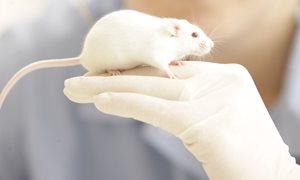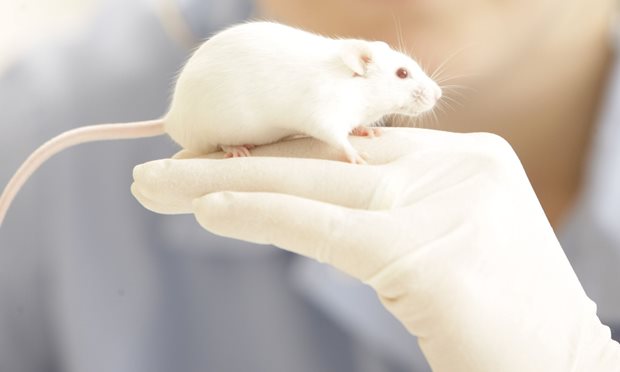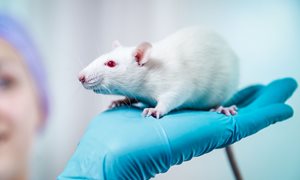

Responsible research with laboratory animals
Radboudumc wants to lead the way in creating sustainable, innovative and affordable health care. This starts with good scientific biomedical research. For most of our research we use laboratory studies and human volunteers, for example. However, for some biological and medical research, animal research is still indispensable or sometimes even required by law.
read moreResponsible research with laboratory animals
At Radboudumc, we want to be on the forefront in creating a sustainable, innovative and affordable healthcare system. Every day we strive for better care, research and education; every day we get a better understanding of how diseases arise and how we can prevent, treat and cure them. In short, we want to have a significant impact on health care: being distinctive together with and for our patients.
This starts with good scientific biomedical research. For most of our research at Radboudumc and Radboud University we use laboratory studies, cell and tissue culture techniques, computer simulations and human volunteers. For some biological and medical research, however, studies in laboratory animals are still indispensable or sometimes even required by law. When there is no alternative, we conduct studies with laboratory animals at Radboudumc. Test animals help us to acquire fundamental knowledge about how humans and animals function and give us insight into the origin and course of certain diseases. This is essential for developing new treatment methods and determining how effective they are.
Animal research is conducted only under strict conditions:
- The research questions cannot be answered by existing scientific literature.
- Alternative methods without the use of laboratory animals are not available.
- Two independent committees, the Animal Research Committee (Dierexperimentencommissie (DEC)) and the Central Committee on Animal Experiments (Centrale Commissie Dierproeven (CCD)), must approve the studies.
- Laboratory animal research is based on the 3Rs: replacement, reduction, and refinement.
- Radboud University has the appropriate facilities, expertise and license to conduct scientific experiments with laboratory animals. The Netherlands Food and Consumer Product Safety Authority (Nederlandse Voedsel‐ en Warenautoriteit (NVWA) periodically checks whether the animal experiments are carried out according to laws and regulations.
- Radboudumc's and Radboud University's laboratory animal research is conducted at the Animal Research Facility.
Why research with laboratory animals?
The research helps us to develop knowledge about how humans and animals function. It also helps us learn more about how certain diseases arise and how they can be treated or cured.
read moreWhy research with laboratory animals?
Within Radboudumc and Radboud University, both fundamental as well as (bio-)medical research is conducted. At present, not all research questions can be answered by laboratory research or research with human volunteers. This is why we also use laboratory animals for our (scientific) studies at Radboudumc.
Animal experiments are currently still an indispensable part of most of biological, medical and veterinary research. They help us to develop knowledge about how humans and animals function, and to learn more about how certain diseases arise and how they can be treated or cured.
Animal research is necessary to:
- Obtain fundamental knowledge of biological processes that can be translated to humans and investigated further in humans.
- Learn how diseases are caused.
- Develop new treatment options and determine how effective they are.
- Develop vaccines and other methods to prevent disease.

Basic principles
When laboratory animal research is conducted, it is done responsibly. In order to do so, Radboudumc strives for the so-called 3 Rs:
- Replacement
- Reduction
- Refinement
Basic principles
When laboratory animal research is conducted, it is done responsibly. In order to do so, Radboudumc strives for the so-called 3 Rs: replacement, reduction and refinement (commissioned by the Centrale Commissie Dierproeven (Dutch) by order of the government).
During each phase, we consider whether a research question can be answered without laboratory animals (replacing), with fewer animals (reducing) or with a reduced level of distress for the animals (refining). Every day we work from these basic principles and in close collaboration with members of the animal welfare body (AWB), biotechniciansand animal caretakers.

Leading the way in reducing
As Radboudumc and Radboud University, our shared ambition is to lead the way in developing and applying techniques and models that help us reduce the number of laboratory animals used in our experiments.
read more
Animal Research Facility
Radboudumc and Radboud University laboratory animal research is conducted in the Animal Research Facility. The facility provides advice, workspace, and expertise from planning to execution.
see pageCommittees
Animal Research Committees assess whether the importance of a study outweighs the harm to the animals. With the advice of a committee, the Central Committee on Animal Experiments determines whether someone is granted a license for animal research. The Central Committee oversees the operations.
visit website (Dutch)Legislation
Radboudumc and Radboud University not only want to comply with the applicable laws and regulations, but we also actively work on new methods and insights to improve animal welfare and reduce the use of laboratory animals.
read moreLegislation
The laws and regulations about animal testing have been expanded during the last decade. The legislation on animal experimentation in the Netherlands is described in the Animal Experiments Act, which is based on and goes beyond the European Directive 2010/63/EU.
Radboud University has a license to conduct scientific experiments with laboratory animals. The Dutch Food and Consumer Product Safety Authority (NVWA) regularly checks whether the animal experiments are conducted according to these laws and regulations.
Every institute licensed to conduct animal experiments annually reports on their experiments with laboratory animals. This information is collected nationally and published in the annual rapport ‘Zo Doende’, the NVWA's annual overview of animal experiments and laboratory animals. Radboud university medical center and Radboud University not only want to comply with the current laws and regulations, but we also actively work on new methods and insights to improve animal welfare and further reduce the use of laboratory animals.
